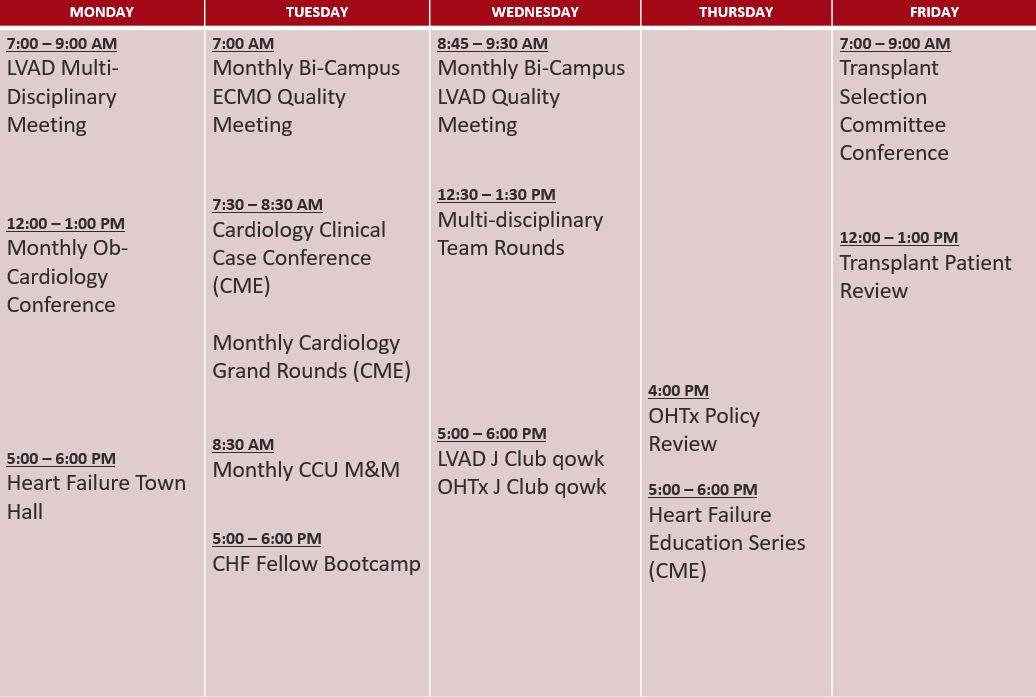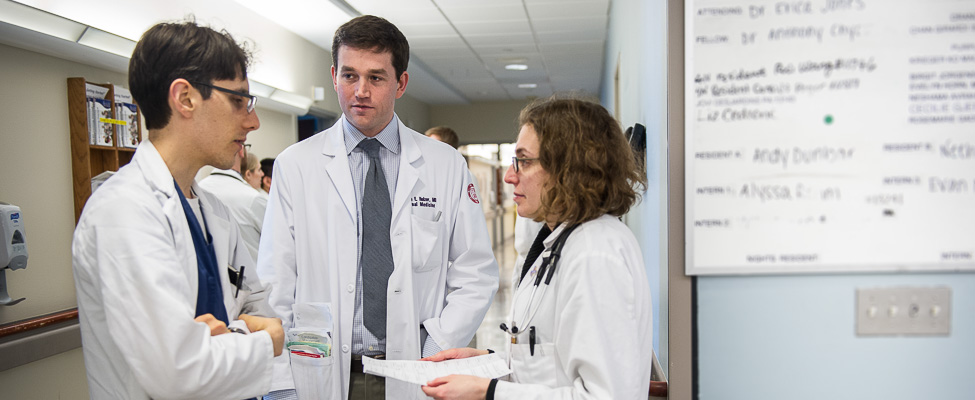Weill Cornell Medical College offers a fellowship in Advanced Heart Failure and Transplant Cardiology, accredited by Accreditation Council for Graduate Medical Education (ACGME).
The Heart Failure Service of Weill Cornell Medical College/NewYork-Presbyterian Hospital has a high volume of clinical activities related to all aspects of heart failure, mechanical circulatory support, pulmonary hypertension, and cardiac transplantation. The fellowship consists of one year of intensive clinical training. The service is made up of 8 attending heart failure specialists at the Cornell campus and 5 more faculty rounding at Cornell from satellite hospitals. They are assisted by nurse practitioners on the inpatient and outpatient service, and research support staff.
This fellowship will provide training in the management of the advanced congestive heart failure patient population. Fellows treat patients with:
- Acute decompensated heart failure (left and right)
- Mechanical assist devices
- Acute support devices and cardiogenic shock
- Perioperative high-risk conventional cardiac surgery
- Approved and investigational catheter or mini surgical valvular interventions
- Heart transplantation
An added strength of the program is in-depth exposure to evaluation and management of pulmonary hypertension in patients with WHO Groups 1-5 PH.
Cardiac Transplantation training takes place at both Weill Cornell and Columbia University Medical Center. Highlights of this program include a strong collaboration with colleagues from cardiac imaging, catheterization lab (including structural heart disease program), electrophysiology, cardiothoracic surgery, cardiac anesthesia, rheumatology, and oncology.
Clinical Experience
Advanced Heart Failure & Transplant Cardiology Fellows are trained in the inpatient and outpatient management of patients with advanced heart failure and pulmonary vascular disease. The one-year fellowship will include 8.5 months of inpatient service, of which 2 months are dedicated to transplant cardiology at NewYork-Presbyterian Hospital/Columbia University Medical Center.
Clinical experiences include:
- Treating a wide spectrum of patients with advanced heart failure, as well as the managing mechanical circulatory support devices, high-risk cardiac surgery patients, complex congenital heart disease, and WHO Groups 1-5 pulmonary hypertension
- Working with a range of mechanical circulatory support, including state-of-the-art left ventricular, biventricular support, as well as ECMO
- Weekly continuity clinic
- Organ procurement, endomyocardial biopsy training, and interrogation of implantable defibrillators and biventricular pacemakers
Specific rotations within the fellowship are:
- Inpatient service including transplant cardiology at both Weill Cornell and Columbia University Medical Center
- Inpatient heart failure service at NewYork-Presbyterian Hospital/Weill Cornell Medical Center
Research
Fellows are expected to take part in research projects with the goal of presenting at national meetings and publishing in peer-reviewed journals. Research is performed on-site in our state-of-the-art clinical and laboratory facilities with internal and external collaborators.
Some of our research program highlights include:
- Over 10 open clinical trials
- A dedicated research team
- Access to multiple databases including:
- LVAD
- Medicare
- HFpEF
- UNOS
- PVDomics
- Shock registry
Additionally, the 4.5 acres surrounding Weill Cornell Campus hold one of the largest concentrations of biomedical research and care anywhere in the world. In addition to the resources within the Weill Cornell Campus of NewYork-Presbyterian Hospital, fellows have access to additional resources at our neighboring sister institutions, Hospital for Special Surgery, the Rockefeller Institute, and Memorial Sloan Kettering Cancer Center. Fellows also have access to the division’s ongoing collaborations with Cornell Tech as well as the graduate schools at Cornell’s Ithaca campus including the Meinig School of Biomedical Engineering and the Brooks School of Public Policy.
Areas of research include:
- Renal transplant and heart failure
- Post OHTx monitoring
- Hypertrophic Cardiomyopathy
- Cardiac Obstetrics
- Precision medicine
Upon competition of the fellowship, fellows also have the opportunity for T32 support post-graduation.
Education
A core curriculum in advanced heart failure, pulmonary hypertension, and transplant cardiology is taught throughout the year by the full-time faculty. In addition, bi-monthly Journal Club and Heart Failure Specialty Conferences are a regular part of the curriculum.
Below features a sample conference schedule:

Instructions to Applicants
Fellows must be enrolled in or have completed a fellowship in cardiovascular disease. Fellows are accepted into the program after completing cardiology training.
Applications for July 2026 Weill Cornell Advanced Heart Failure and Transplant Cardiology Fellowship will begin being accepted after July 2nd, 2025, with a deadline of September 1st, 2025.
Our program is part of the Medical Specialties Matching Program at the National Resident Matching Program (NRMP), which means that on August 27th, 2025, registration begins with NRMP at www.nrmp.org. Click on specialty match (Cardiovascular Diseases) or call (202) 400-2233 or (866) 653-NRMP (6767) for more information.
Application Schedule
- Notifications are sent out in September 2025 to schedule virtual interviews via Zoom.
- October 1st, 2025, is the earliest date to file a rank order list on the NRMP website.
- November 19th, 2025, is the deadline to file rank order list on the NRMP website by 9PM EST.
- December 3rd, 2025, the match results are announced at 12PM EST.
Use the Electronic Residency Application Service (ERAS) through your Dean's Office and join the National Resident Matching Program (NRMP).
ERAS Program Code: 1593514027
NRMP Program Code: 1492159S0
Please comply with the following guidelines when completing your application. Only applications with all requested materials will be reviewed.
- Completed ERAS Application
- Letters of Recommendation
- These should be from 2-3 faculty members who have personal knowledge of your professional and personal qualifications. One of these letters should come from your program director or from the service chief under whom you have last served. It is ok to submit more than three letters is ok.) We do not require a Dean's letter.
- Providing USMLE scores is voluntary.
International Applicants
Applicants should have research experience, letters of recommendation from their clinical, and/or research supervisors in the United States and valid ECFMG certification. Though there is no specific board score requirement, a higher score holds greater weight. NewYork-Presbyterian Hospital sponsors J-1 visas only. H1-B visas are not eligible. You will be responsible for retaining an immigration lawyer and for all associated administrative costs. Use the Electronic Residency Application Service (ERAS) through the Educational Commission for Foreign Medical Graduates (ECFMG); and join the National Resident Matching Program (NRMP) for a subspecialty in Cardiovascular Disease. Applicants will be considered for an interview based on their overall record.


